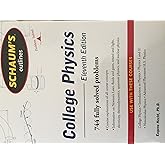
Download the free Kindle app and start reading Kindle books instantly on your smartphone, tablet, or computer - no Kindle device required.
Read instantly on your browser with Kindle for Web.
Using your mobile phone camera - scan the code below and download the Kindle app.

Physics: Calculus 1st Edition
- ISBN-100534339859
- ISBN-13978-0534339852
- Edition1st
- PublisherBrooks Cole
- Publication dateJanuary 5, 1996
- LanguageEnglish
- Dimensions1.75 x 8.75 x 10.25 inches
- Print length1240 pages
There is a newer edition of this item:
Popular titles by this author
Editorial Reviews
About the Author
Product details
- Publisher : Brooks Cole; 1st edition (January 5, 1996)
- Language : English
- Hardcover : 1240 pages
- ISBN-10 : 0534339859
- ISBN-13 : 978-0534339852
- Item Weight : 5.35 pounds
- Dimensions : 1.75 x 8.75 x 10.25 inches
- Best Sellers Rank: #4,399,547 in Books (See Top 100 in Books)
- #1,368 in Mathematical Physics (Books)
- #2,746 in Physics (Books)
- Customer Reviews:
About the author

Discover more of the author’s books, see similar authors, read book recommendations and more.
Customer reviews
Customer Reviews, including Product Star Ratings help customers to learn more about the product and decide whether it is the right product for them.
To calculate the overall star rating and percentage breakdown by star, we don’t use a simple average. Instead, our system considers things like how recent a review is and if the reviewer bought the item on Amazon. It also analyzed reviews to verify trustworthiness.
Learn more how customers reviews work on AmazonTop reviews from the United States
There was a problem filtering reviews. Please reload the page.
- Reviewed in the United States on May 9, 2010Many years after completing an undergraduate physics degree, I ordered Hecht's Physics book as a replacement for my misplaced Halliday/Resnick. At the time, several aspects of the book caught my attention and motivated my purchase. One was the unusual number of sidebars and examples dealing with interesting everyday applications and easy to perform experiments. Another was its mention of underlying themes; in particular, Noether's Principle is not just mentioned, but is used as a unifying framework for the more fundamental concepts being introduced. And, I was also familiar with Hecht's book on Optics.
I haven't regretted the purchase at all. Over the years, I used Hecht's Physics book for quick refreshers on various topics, occasionally learning minor but interesting details that I hadn't encountered during my undergraduate education. Earlier this year, I decided to read the book cover to cover (bedtime reading) to catch all the tidbits in the sections I hadn't yet perused. I found it enjoyable and time well-spent. Although the math is lightweight (being an introductory book), Hecht is an excellent expositor and it made for easy reading. I recommend this book to anyone interested in learning about physics and the role it plays in our everyday lives.
- Reviewed in the United States on June 3, 2005I used this book to teach general physics II last semester. This book is compared nothing with Serway, Tipler, Halliday. The problems are too below the level of general physics and poor multimedia, the chapters and sections are completely unorganized.
I do not recommend this book for any thing
- Reviewed in the United States on March 15, 2003I used this book in intro physics as a college junior. The maths were gentle, and the problems very well set up. Hecht's writing style is easy to read, and often quite humourous. Of the large stack of science textbooks I have acquired so far, these two volumes are definitely two of the most useful and easy to understand.
- Reviewed in the United States on February 21, 2001I am a senior in High School adn currently using this book as the text for my AP Physics Class. After unsing it for a semester, I have found it has definate strong points (good diagrams, lots of example problems throughout the text) however, this doesn't make up for how how complicated Hecht makes simple concepts sound. His equations often are made to cover all instances, using limits and vectors when most of the time, at least at first, they are not needed. It would be far simlier and less daunting to see a simple equation in the text and later come across a more inclusive one. Another complaint I have is the ordering of the chapter..For God's sake, he put the chapter on Energy before the chapter on Momentum..the opposite of the order every other Physics book (and logic) order it. So, if you have any choice (ie it is not the class text), choose another book, you will understand Physics much better!
- Reviewed in the United States on December 18, 2001I can't believe that I have to use this book for my class. It is so hard to understand and I am thinking of committing sucide because of the class. Any book is better then this!












